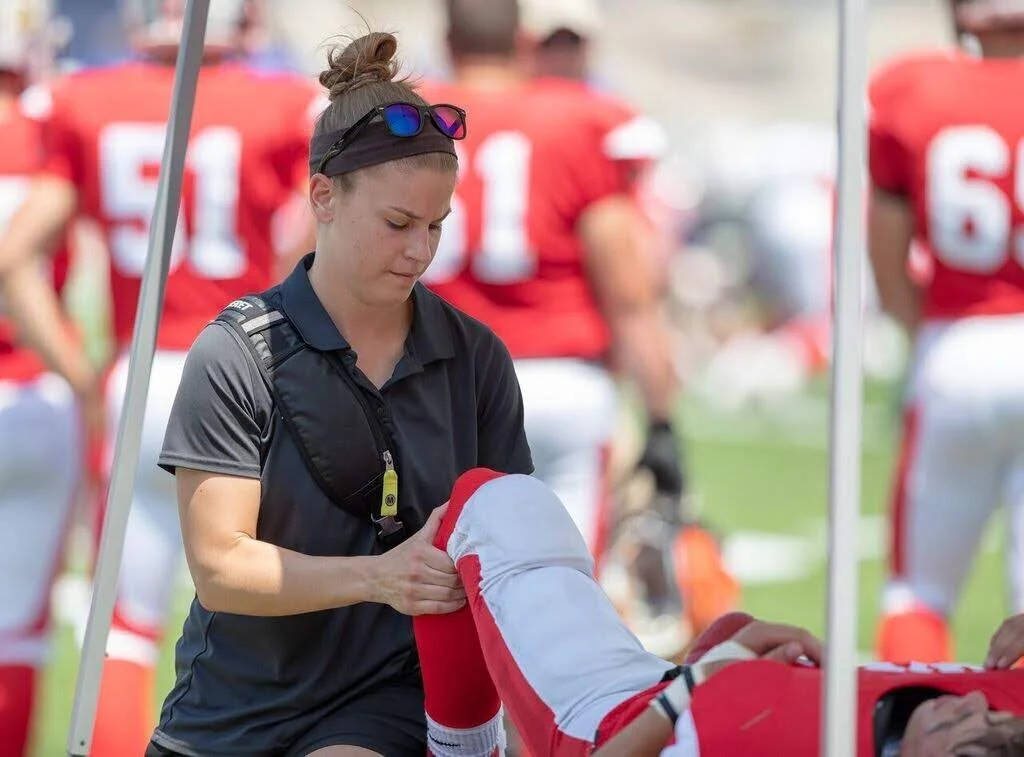Katelyn Metzger, an athletic trainer with the Safe Sports Network, treats a football player. The non-profit has shifted its focus during the pandemic, although it hopes to have trainers back on the field this fall.
Kelly Burch, Granite State News Collaborative
Katelyn Metzger, an athletic trainer with the Safe Sports Network, treats a football player. The non-profit has shifted its focus during the pandemic, although it hopes to have trainers back on the field this fall.
Under normal circumstances, the 14 employees of the Safe Sports Network are treating ankle sprains or evaluating players for signs of concussions. But since the pandemic, they’re more likely to be found helping with temperature screenings at local businesses or guiding school districts on policies to keep young athletes safe when, and if, school sports resume in the fall.
“As athletic trainers we have a very unique and varied skill set,” said Amy Hollingworth, incoming executive director of the Safe Sports Network, who has been involved with the organization for more than 20 years. “We can offer these services.”
The Manchester-based nonprofit aims to address children’s sports injuries and keep kids protected on the playing field. The organization has athletic trainers at nine area high schools and operates a drop-in injury clinic in Manchester where young athletes can meet with athletic trainers free of charge.
When the pandemic hit and school and youth sports shut down, the Safe Sports Network quickly switched to delivering telehealth services, especially for kids who were dealing with existing injuries. The organization also started producing content on it’s social media pages to encourage good nutrition, fitness and mental health while everyone was stuck at home.
“We tried to be nimble and agile to meet the needs of our kids,” Hollingworth said.
At the same time, the non-profit was able to redirect staff hours to “the things you never have time for,” like reviewing and updating policies and best practices, Hollingworth said. But as the months went on, those projects finished up.
In May, the Safe Sports Network redirected staff members to help with screening implementation at businesses that were reopening. With their medical background, athletic trainers are uniquely suited for the task, and it allowed the Safe Sports Network to keep employees working.
“We can help out in this time of crisis,” Hollingworth said. “We wanted to be able to do our part.”
Now, the Safe Sports Network is beginning to help with reopening plans. While sports practices have started back up in the state, the organization’s school athletic trainers won’t return to the fields and locker rooms until August. The drop-in clinic will open in early July.
In the meantime, the significance of safe sports has been amplified, Hollingworth said. The organization is no longer focused on sports injuries, but also on implementing best practices around disease prevention. The Safe Sports Network has been working closely with school districts and state organizations to help shape policies for when young athletes again take to the fields.
“We’ve been included in the conversations in a much more increased capacity,” Hollingworth said.
Athletic trainers have an intimate knowledge of sports and training practices, so they’re uniquely capable of drafting policies that will have a real impact on kids’ safety during practice and games, Hollingworth said. Right now, the organization is helping shape policies for the fall season, which might include contactless competition or other measures to reduce the risk of COVID-19.
“If we are going back, we’re keeping things as safe as possible for the kids,” Hollingworth said, noting that no decisions for the fall have been made.
Running a non-profit during an economic shutdown has been challenging. A major in-person fundraiser for the organization in March had to be cancelled, replaced with a virtual fundraiser. Some major supporters put a temporary hold on contributions, but they’ve since started back up. That, combined with state and federal grants, has kept the Safe Sports Network “in a really solid spot,” Hollingworth said.
“That’s comforting for us.”
Although no one knows yet what youth sports will look like during the 2020-2021 school year, Hollingworth said the trainers at The Safe Sports Network are eager to return to working directly with young athletes.
“We will be ready, as long as they’re ready, for whatever sports look like in mid-August,” she said.
This story is part of the 50 Businesses, 50 Solutions series, shared by partners in The Granite State News Collaborative, that aims to highlight how business leaders across the state, from mom and pop shops, to large corporations have adapted to meet the challenges and disruptions caused by the novel coronavirus in the hopes others may be able to replicate these ideas and innovations. Tell us your story here. For more information visit collaborativenh.org.

